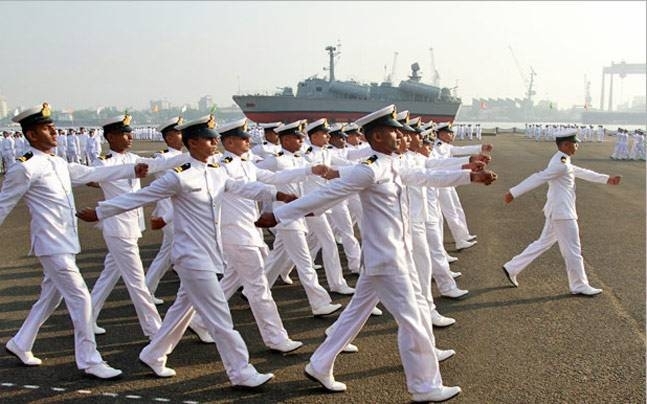Indian Navy vs Merchant Navy? What is the Difference & which one is Better?
By BYJU'S Exam Prep
Updated on: September 11th, 2023

Indian Navy Vs Merchant Navy: The reason for the comparison is that most people do not understand the distinction between the Merchant Navy & the Indian Navy. They are both present in the marine world, but they serve multiple functions and cannot be compared. Though careers in both of these fields have a similar foundation, there are a few differences to be aware of before embarking on a seafaring career.
Both the merchant navy & the Indian navy have advantages and disadvantages, but it is ultimately up to the individual to decide based on his or her interests and inclinations before deciding on one. There are two ways to enter the maritime workforce: through the respective nation’s naval services or through merchant marine services. However, while both are marine services, the differences between them are numerous and must be clarified before deciding on a career path.
In this article, we will attempt to explain the main differences between both the merchant navy and the Indian navy, as well as what one can expect from a career in each.
Table of content
Differences Between the Merchant Navy and the Indian Navy
The Merchant Navy & Indian Navy are two distinct branches that serve the nation’s maritime needs. They each have their own distinct roles to play, but they all share the goal of serving their country. To better understand some of the questions asked by navy aspirants & those who are curious about the service of the Merchant Navy as well as the Indian Navy, here are the distinctions:
Indian Navy Vs Merchant Navy: Job Profile
- The term ‘merchant navy’ refers to commercial marine services, as the name implies. Such commercial activities also include cargo & people shipping to and from various locations around the world. In other words, merchant marine tasks are not indigenous or native to any one nation but are spread across countries around the world.
- To ensure stability in the activity conducted out, merchant marine, as it is known colloquially, must adhere to certain rules & regulations framed by governing bodies. To sum up, the merchant navy is a purely commercial type of sea career that is governed by both private as well as public shipping companies.

Image Source: Marinegalaxy.com
- Defence Navy, on the other side, refers to a country’s naval military wing. Naval ships are those that are used during international crises to protect a country’s water borders from being infiltrated or attacked unnecessarily. Every country with a coastline has its own navy service with its own set of rules & regulations. As a result, a career in the defence navy would entail serving the country by serving on warships.
- Ships are used in both the merchant navy & defence. While the first step is purely commercial, the second step involves respectable & skilled careers.
Attempt Unlimited Tests to Join Indian Navy- Click Here
Indian Navy Vs Merchant Navy: Eligibility
- For entry into the maritime services, both the merchant navy & the navy have their own set of eligibility criteria. Individuals interested in a career in merchant marines must have a basic high school diploma with subjects such as physics, chemistry, and mathematics. Individuals interested in applying for higher-level positions in the scientific field, on the other hand, must have a graduate degree in science.

Image Source: Bussinessinsider.com
- The most important requirement for joining a nation’s armed forces is that the applicant be a citizen of that country. In contexts of eligibility criteria, this is the most significant distinction between the merchant navy and the navy. The majority of the world’s navies have their own entrance & screening exams to select the best candidates. However, in terms of fitness & medical condition, both the merchant & defence navy have the same requirements.
Join Indian Navy Online Coaching to get expert guidance to help you prepare for the exam in the best manner.
Indian Navy Vs Merchant Navy: Pay Scale
- This is one of the most frequently discussed topics among candidates considering a career at sea. The pay scales in the merchant marines are determined by international institutions such as the ILO (International Labour Organization) and the ITF (International Transport Workers’ Federation).
- The pay scales in merchant marines are set according to the job hierarchy, and each individual is entitled to the same. The merchant marine is already well-known for its high pay packages and glamorous life onboard a ship.
- The pay scale in the navy, on the other hand, is determined by an individual’s position and total work experience. The pay scale is determined by a country’s laws and varies from one country to the next.
- It is worth noting that, while the pay of merchant navy officers is always a topic of discussion, a career in the defence navy comes with the highest level of respect & pride.

Image Source: Amarujala.com
Indian Navy Vs Merchant Navy: Ranking Structure
- Both the merchant marine & the navy have their own hierarchical systems. Jobs in the merchant navy can be found in the technical department, the deck zone, or the servicing area. Individuals with the appropriate aptitude & skill set can participate in any of the three specialised criteria. Furthermore, the ranks of professionals can vary depending on the company & type of ship. However, the fundamental structure remains the same.
- In the navy, however, sea jobs begin at the lieutenant level, which is the lowest rung in terms of ranking. Navy servicemen are assigned different ranks in each country, making them unique in their own right. Each rank in the Defence Navy, like those in the Merchant Navy, carries a great deal of responsibility as well as honour.
To summarise, the merchant navy is a purely commercial type of sea career that is governed by both private and public shipping companies. Jobs in the navy & merchant marine necessitate a high level of commitment and dedication on the part of individuals due to the length of service required. The threat of infiltrators looms large in the case of the former, whereas the necessity of commercialisation makes shorter trips impossible in the case of the latter. Despite their differences, the most common similarities between these two maritime services are that they both provide high levels of satisfaction to those who work in them.
Also, check:
Thanks
Download the BYJU’S Exam Prep App Now
The Most Comprehensive Exam Prep App
#DreamStriveSucceed

